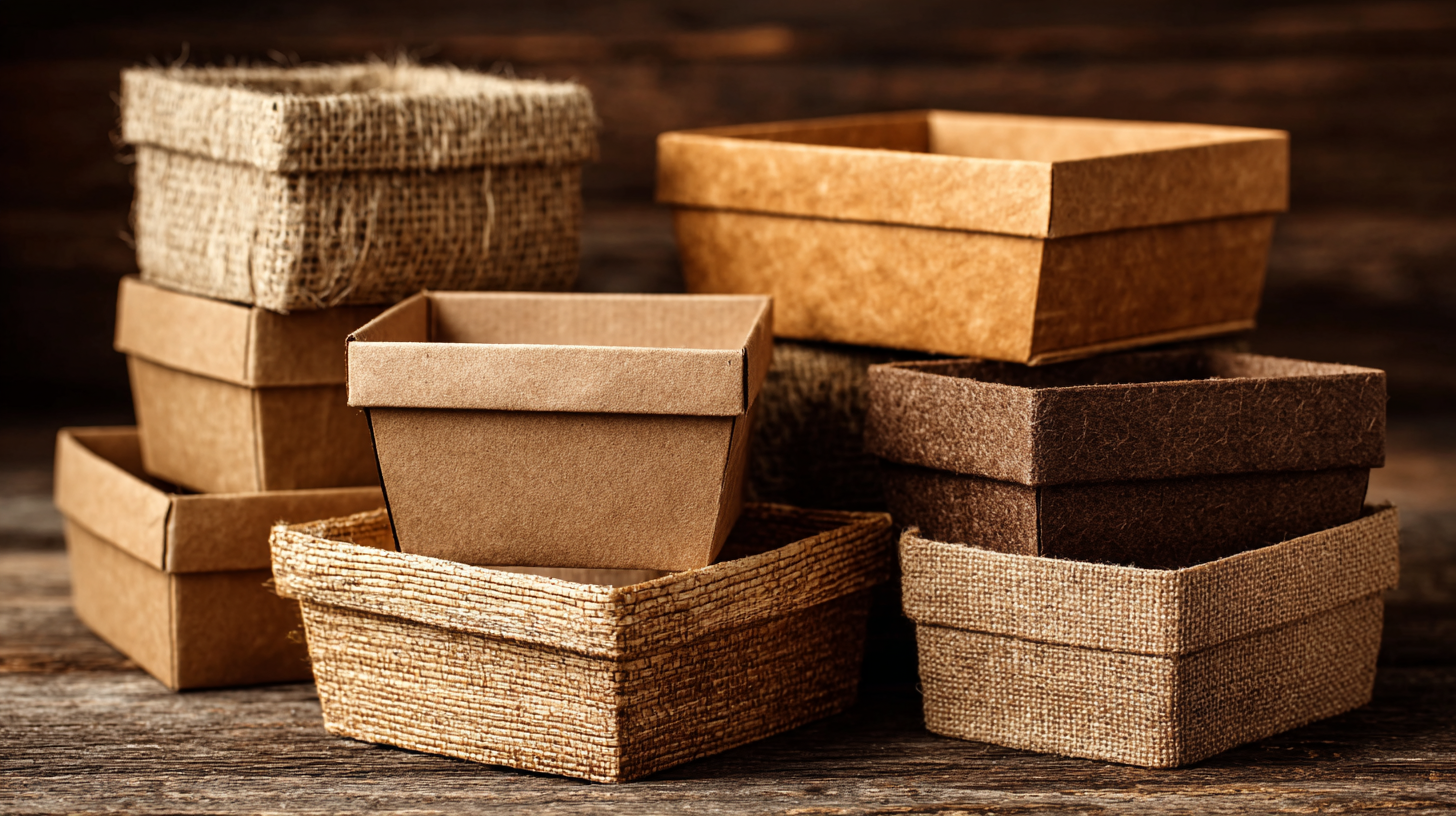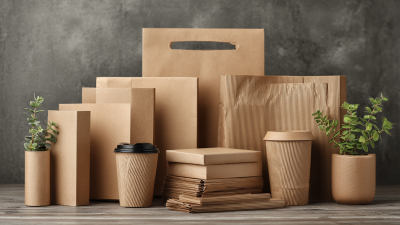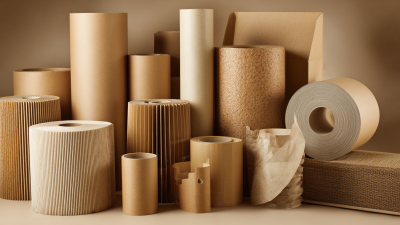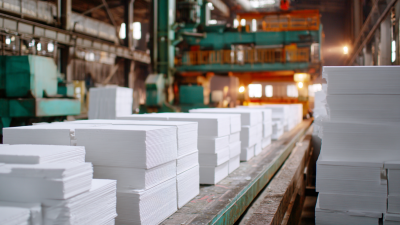As businesses increasingly recognize the urgent need for sustainable practices, the packaging industry is undergoing a remarkable transformation with the rise of eco friendly packaging materials. According to a recent report by Smithers Pira, the global market for sustainable packaging is projected to reach $530 billion by 2024, driven by demand from environmentally conscious consumers and stringent regulations on waste. In this landscape, eco friendly packaging materials are not just a trend but a necessity for companies looking to improve their environmental impact while maintaining competitive advantage.
 Renowned packaging expert Dr. Emily Thompson states, "The shift towards eco friendly packaging materials is not only beneficial for the planet but also enhances brand loyalty and consumer trust." This sentiment underscores the growing recognition that adopting sustainable packaging solutions can serve as a strategic differentiator in an increasingly crowded marketplace. By leveraging innovative materials such as biodegradable plastics, recycled paper, and plant-based composites, businesses are not only reducing their carbon footprint but also appealing to a demographic that prioritizes environmental responsibility.
Renowned packaging expert Dr. Emily Thompson states, "The shift towards eco friendly packaging materials is not only beneficial for the planet but also enhances brand loyalty and consumer trust." This sentiment underscores the growing recognition that adopting sustainable packaging solutions can serve as a strategic differentiator in an increasingly crowded marketplace. By leveraging innovative materials such as biodegradable plastics, recycled paper, and plant-based composites, businesses are not only reducing their carbon footprint but also appealing to a demographic that prioritizes environmental responsibility.
In this article, we will explore the top 10 eco friendly packaging materials that are shaping the future of sustainable business practices. By highlighting the advantages of these materials and their practical applications, we aim to inspire companies to invest in more sustainable alternatives that align with the evolving expectations of consumers and regulators alike.
The landscape of packaging sustainability is experiencing a revolution, mainly driven by innovative biodegradable plastics. A recent partnership focused on developing next-generation sustainable and renewable bioplastics highlights the industry’s commitment to reducing reliance on petroleum-based materials. Utilizing yeast and bacterial fermentation, this initiative aims to create alternatives that not only promise eco-friendliness but also maintain the functional integrity of packaging solutions.
The rise in consumer demand for sustainable packaging is reflected in market projections, with the sustainable packaging solutions market expected to reach $882.62 billion by 2033. This surge is propelled by not only the environmental regulations but also a growing inclination among consumers for eco-friendly products. The biodegradable plastics market is witnessing a significant shift, as new materials emerge, from plant-based options to advanced paper alternatives, all of which are essential in reshaping how products are packaged, protected, and presented in an increasingly eco-conscious world. This trend is particularly evident in the food packaging sector, where initiatives for recyclable and biodegradable solutions are set to double by 2032, underscoring the urgency of sustainable innovation.
The rise of recyclable materials has played a pivotal role in transforming sustainable business practices. Today, eco-conscious businesses are increasingly opting for packaging solutions that not only reduce waste but also contribute to a circular economy. From biodegradable plastics to recycled paper products, companies are innovating to lessen their environmental impact while meeting consumer demands for sustainability. This shift toward recyclable materials not only enhances brand image but also resonates with a growing demographic of environmentally aware consumers looking to support green businesses.
**Tips for Implementing Recyclable Packaging:** Start by evaluating your current packaging options and identify areas where recyclable materials can be introduced. Consider partnering with suppliers who prioritize sustainable practices, ensuring that the entire supply chain aligns with your eco-friendly goals. Additionally, educate your customers about the importance of recycling and how they can dispose of your packaging responsibly. Clear labeling and instructions can promote recycling and enhance consumer engagement.
By prioritizing recyclable materials, businesses can significantly reduce their carbon footprint while driving customer loyalty. The transition to eco-friendly packaging is not only beneficial for the planet but also positions brands as leaders in sustainability, ultimately paving the way for more responsible consumer choices in the future.
| Material | Recyclability | Biodegradability | Renewable Source | Industry Usage |
|---|---|---|---|---|
| Recycled Paper | Yes | Yes | Yes | Food & Beverage |
| Bioplastics | Yes | Yes | Yes | Retail |
| Mushroom Packaging | Compostable | Yes | Yes | Electronics |
| Glass | Yes | No | No | Cosmetics |
| Plant-Based Foam | Yes | Yes | Yes | Furniture |
| Bamboo Packaging | No | Yes | Yes | Home Goods |
| Corn Starch Packaging | No | Yes | Yes | Agriculture |
| Leaf Packaging | No | Yes | Yes | Food Service |
| Recyclable Metals | Yes | No | No | Beverages |
| Compostable Film | No | Yes | Yes | Retail Packaging |
As businesses increasingly prioritize sustainability, plant-based packaging solutions are at the forefront of this transformation. These innovative materials, derived from renewable resources such as cornstarch, mushroom mycelium, and sugarcane, not only reduce dependency on fossil fuels but also offer biodegradable alternatives to traditional plastics. This shift towards plant-based options is not just a trend; it represents a significant change in how companies approach their environmental impact.

The benefits of plant-based packaging extend beyond sustainability. Many consumers today actively seek out brands that demonstrate environmental responsibility, and adopting eco-friendly materials can enhance a company’s image. Moreover, these packaging solutions often provide functional advantages, such as moisture resistance and lightweight properties, which can lead to cost savings during transportation. By investing in plant-based materials, businesses are not only adhering to regulatory pressures but also positioning themselves as leaders in the sustainable economy, reshaping consumer expectations in the process.
In recent years, minimalist packaging designs have emerged as a crucial strategy for companies aiming to enhance sustainability while reducing their environmental footprint. According to the World Economic Forum, up to 91% of plastic waste is not recycled, which highlights the urgent need for innovative packaging solutions. Minimalist packaging not only reduces the amount of material used but also cuts down on energy consumption during production and transportation. By adopting a simpler approach, brands can effectively minimize waste and promote a circular economy.
Moreover, the benefits of minimalist designs extend beyond environmental considerations; they also resonate with consumers. A survey conducted by Mintel found that 56% of global consumers are willing to pay more for sustainable packaging. This trend reflects a growing awareness of environmental issues, pushing brands to rethink their packaging strategies. Companies such as Unilever have committed to reducing their plastic use by 50% by 2025, showcasing the positive market reaction to eco-friendly and minimalist designs. As businesses pivot towards minimalism, they not only meet consumer demands but also contribute significantly to the preservation of our planet.
 Compostable packaging is gaining traction as a crucial component of waste reduction strategies in sustainable business practices. Unlike conventional packaging, which can take hundreds of years to decompose, compostable materials break down into organic matter, enriching the soil and reducing landfill waste. This transformation not only aligns with eco-friendly initiatives but also appeals to environmentally conscious consumers. Businesses adopting compostable packaging can significantly minimize their ecological footprint while enhancing brand loyalty.
Compostable packaging is gaining traction as a crucial component of waste reduction strategies in sustainable business practices. Unlike conventional packaging, which can take hundreds of years to decompose, compostable materials break down into organic matter, enriching the soil and reducing landfill waste. This transformation not only aligns with eco-friendly initiatives but also appeals to environmentally conscious consumers. Businesses adopting compostable packaging can significantly minimize their ecological footprint while enhancing brand loyalty.
Tips for Implementing Compostable Packaging:






Get Free Estimate!

